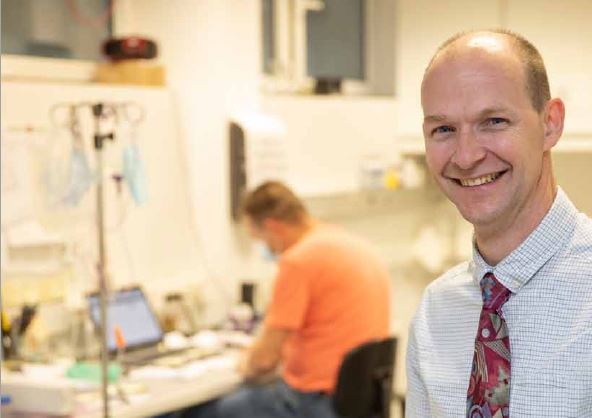How to navigate your team through troubled waters?
Corona in the healthcare and retail sector
Two sectors that have been blown completely off course in recent months are the healthcare and retail sectors. Due to the contamination risks and the large number of covid-19 patients, the healthcare sector transformed towards an unprecedented long-term crisis approach. In the retail sector – certainly in non-food – everything suddenly came to a standstill for a second time now. Kader magazine asked two managers from the relevant sectors who are also present in the workplace themselves, how they experienced this period of crisis.
Ann Snoeckx is store manager at the WE branch in Turnhout. With 38 years of seniority under her belt, she has seen it all. However, this double lockdown was a first for her as well.
Gunther Groenen is responsible for the biotechnical department of the Hospital Network Antwerp (ZNA). During the crisis, his team had to ensure that all available medical equipment was brought to where it was most needed.
How did you experience the corona crisis?
Ann: Our stores were closed during the lockdowns. But that does not mean we had nothing to do. I have not had a single day off in the past period. We continue to take care of the shop windows and accommodate the transfers from our shops to the e-com department. Our stock is also used for shipping to digital customers. Furthermore, there are calls with management, there is the need to divide the available work between the team members and the organization of a multitude of training courses. The latter are on a voluntary basis and are not considered working time. However, there is a certain amount of pressure to follow them. That is not easy, certainly not for colleagues with young children.
Gunther: It was more hectic than usual. There was always a need to quickly address current developments. A department that was converted into a Covid department needed a change of equipment, for which we then had to look at one of the other branches of the group, or had to rent or buy. The physical relocation of the equipment was not the most difficult part. A lot of time was spent making arrangements about what could be relocated or not from where. I did manage to find my groove in this hectic atmosphere. For years, I have been involved in (crisis) management as a volunteer for the Flemish Cross. I was also there in a leadership position during the 2011 Pukkelpop disaster. This was also a situation in which we had to pivot and improvise on the spot. And above all, stay calm. By the way, I received compliments from my team members for staying so calm and bringing a sense of calm to the team. That was nice to hear.
What were some of the difficult times for you during the crisis?
Ann: Keeping my team members engaged was not easy. You see less of them during periods of  temporary unemployment. Some fell back to 7 hours a week. It is difficult in such a situation to keep an overview of what you already communicated to whom. Even when the shops were open, workers sometimes worked only few hours and were often still temporarily unemployed. It is more difficult to keep everyone involved under these circumstances. The workload was also greater at the same time. We had to do the same work with fewer people because we only managed half of the turnover. And during the second lockdown, fear for the future struck a number of colleagues. What will happen? Will the store even reopen? What if there are layoffs?
temporary unemployment. Some fell back to 7 hours a week. It is difficult in such a situation to keep an overview of what you already communicated to whom. Even when the shops were open, workers sometimes worked only few hours and were often still temporarily unemployed. It is more difficult to keep everyone involved under these circumstances. The workload was also greater at the same time. We had to do the same work with fewer people because we only managed half of the turnover. And during the second lockdown, fear for the future struck a number of colleagues. What will happen? Will the store even reopen? What if there are layoffs?
Gunther: For us, it was not always easy to know who was running the organization. We already had a complex structure with different branches and departments. But this was aggravated even further. Who is at the wheel? After the first crisis things remained busy for a while because all of the equipment had to be returned to its original location. And now everything has moved back again. Things did move more quickly the second time around. Many arrangements had already been made during the previous crisis.
Were there also things you happened to like about the crisis?
Ann: Not really. Except that I became a grandmother in September, in between the two lockdowns. But that is not what you meant, is it? (laughs)
Gunther: I was actually in my element. I drew a lot of energy from the hectic pace. And from the appreciation. There was also more cooperation between various departments, because we had a common goal, namely to tackle this virus.
What could have made your task easier?
Ann: Communication is difficult. I have no work computer and have to make do with my personal belongings. I am doing this interview on my smartphone. At the beginning of the call my battery was at 100%, it is now only at 70. It is difficult to work like this. At work I have a computer, but it does not have a sound card. So it is not useful for online meetings either.
 Gunther: Smoother communication and flow of information. And quicker involvement. That could have prevented quite a bit of panic. But we have learned from it. During the second crisis, there was much more clarity about who was allowed to make what decisions. Better agreements have been made with the non-acute hospitals, we have a better overview of what is available in-house and the shortage during the second peak was mitigated by purchasing extra equipment. On the other hand, almost all activities were halted during the first wave, while this time around attempts were made to maintain a number of activities. Which meant that we now faced new challenges.
Gunther: Smoother communication and flow of information. And quicker involvement. That could have prevented quite a bit of panic. But we have learned from it. During the second crisis, there was much more clarity about who was allowed to make what decisions. Better agreements have been made with the non-acute hospitals, we have a better overview of what is available in-house and the shortage during the second peak was mitigated by purchasing extra equipment. On the other hand, almost all activities were halted during the first wave, while this time around attempts were made to maintain a number of activities. Which meant that we now faced new challenges.
How do you keep in touch with your colleagues?
Ann: Primarily via WhatsApp. In our staff group, I communicate who can work when. But we also use this group informally. We share jokes or fun messages to keep the mood buzzing. A lot also happens via email with my own superior.
Gunther: I mainly keep in touch through Teams. More than before. During peak periods, we had a short meeting every day. This has slowed down a bit, but Teams is here to stay. We used to meet physically, always at one of the locations. But this was always a difficult trip for colleagues. Often it simply did not happen. It is now easier via Teams. I also try not to go overboard with communication. Because of excessive communication, my employees grew a bit weary of information during the crisis. As a result, they sometimes risked missing out on important information.
How do you view the future?
Ann: I am incredibly excited to see the shops open again. It can also be done safely, because we have put a lot of effort into safety for customers and staff. Disinfecting changing rooms, steaming clothes, continuously disinfecting cash registers, never allowing more than 35 people in the shop at the same time, … But the future does seem a bit gloomy to me. I fear it will take some time. And this year’s crisis has hit the numbers hard. The e-com department is doing well, but of course it does not make up for all loss of turnover. I am fearful of store closures and layoffs. We are lucky that we are not a listed company and that the owner of WE absolutely lives for the company.
Gunther: I hope that the crisis will lead to enhanced structure within the organization. The crisis has shown that such a need exists. And it would also be nice if a number of procedures could be relaxed. During the crisis, everything could and had to run very quickly and smoothly. Hopefully we can review a number of strict procedures and make decisions more autonomously.

